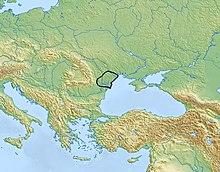 | |
| Geographical range | Northwest Black Sea |
|---|---|
| Period | Copper Age |
| Dates | ca. 3500–3000 BC |
| Preceded by | Suvorovo culture, Repin culture, Cucuteni–Trypillia culture |
| Followed by | ? |
The Usatovo culture is a late variant of the Cucuteni–Trypillia culture which flourished northwest of the Black Sea from 3500 BC to 3000 BC.
The Usatovo culture appears to be a mixture of Neolithic elements of Southeast Europe with intrusive cultures from the Pontic steppe. From native Neolithic elements it shares flat graves, figurines and painted ceramics, while it shares tumulus burials, horses and shell-tempered coarse wares with steppe cultures. It also displays metallic items such as arsenical bronze and silver, which suggests contacts with the North Caucasus.
Within the Kurgan hypothesis, the Usatovo culture represents the domination of native Cucuteni–Trypillia agriculturalists by Indo-European peoples from the steppe. According to Anthony, the roots of the Germanic languages lay in the Usatovo culture.[1]
See also
- Suvorovo culture
- Novodanilovka group
References
- ^ Anthony 2007, p.359-360
Sources
- Mallory, J. P.; Adams, Douglas Q. (1997). "Ustatovo culture". Encyclopedia of Indo-European Culture. Taylor & Francis. p. 614. ISBN 1884964982.